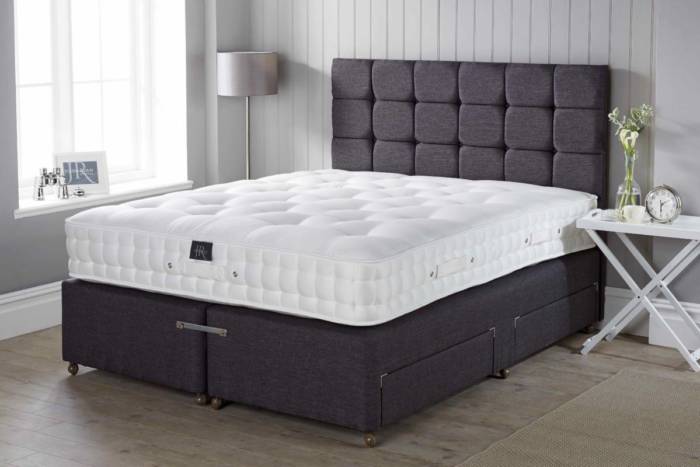Sleep & Well Being, Mattress Science
January 2019Why Do I Constantly Get So Hot And Bothered When I Sleep?
Your body temperature when you sleep is very important, and can actually play a pivotal role in your sleep cycle. The weather and what you do throughout the day, can of course cause your body temperature to constantly fluctuate. But at night, just before you drift off, it will drop in order to induce sleep.
However, many people frequently have their sleep interrupted because they suddenly get too hot. If you suffer from this persistent rise in body temperature it can lead to frustratingly restless nights, where you wake up feeling sweaty, clammy, and sticking to the sheets. We wanted to go through the main reasons why you get so hot when you sleep, and how to avoid them. So that you can stay cool, calm and relaxed at night.
You’re bedroom temperature isn’t right

When you enter into REM (rapid eye movement) sleep, your brain’s ability to regulate your body temperature is essentially switched off, meaning the temperature of your room can more directly influence your own. If your bedroom is too hot or too cold then your sleep could be disturbed during this time.
There’s no best temperature to keep your bedroom at, because everyone’s ideal comfort levels in terms of temperature can vary. Typically, keeping your bedroom cool instead of warm will help your core body temperature to drop correctly when you enter REM sleep. It’s recommended that you keep your sleep environment at around 60 to 65 degrees Fahrenheit or 15 to 18 degrees celsius.
Also, if you always keep your bedroom window closed then no fresh cool air can enter the room. Then when the room gets too hot, your body will start to sweat more to compensate. Open the windows at some point during the day, so that cool air can enter your room and make it more comfortable. You don’t have to keep them open if it’s too cold, it’s important to find the right balance. Leaving a bedroom door ajar can always help airflow throughout the night.
You’re washing at the wrong time

You might, like many other people, have a shower or bath at night to feel nice and clean before getting into bed. Taking a warm shower or bath before bed can also help to prepare your body for sleep. This is because the warm water initially increases your body temperature, allowing it to then drop as soon as you get out. A bath is actually a bit more effective than a shower in getting your body ready for rest, however, you’ll want to avoid taking one too close to bedtime.
If you shower or bath in hot water shortly before going to bed without a suitable gap in between, then this can actually leave you feeling too hot, disrupting your ability to doze off. Make sure you soak up the warm water around 60 to 90 minutes before you get into bed, as this will give your body enough time to adjust.
You need the right mattress
Regulating your body temperature at night mostly comes down to the materials used in the construction of your mattress. Many have turned to memory foam and synthetic fibres, but these are actually the warmest mattress materials available.
What the foam mattress manufacturers don’t tell you is that memory foams actually require heat to mould around you. This is what makes them able to wrap around you and conform to your body shape. This in turn also means that you’re held by the foam mattress and trapping this heat during the night. Leading to you getting warmer and warmer. That’s why memory foam feels so firm when you first get into bed, because its cold and slow to react. As it warms up it softens.
If you’re a hot sleeper anyway, then choosing a mattress made from these materials will certainly cause you to overheat. It also means you’ll be more than likely perspiring more during the night as your body tries to cool itself down. This in turn will lead to a faster degradation of your mattress due to sweat.
Memory foam, and other synthetic man made fibres, hold onto your body heat for far longer than you’d like with no means of the heat escaping as foams are the least breathable of upholstery materials. Often the only way to cool them down is to actually stop sleeping on them.
If you’re already a warm sleeper, then a Memory foam mattress is definitely a no go! In fact we’ve answered hundreds of questions on our site all about hot sleepers and the drawbacks of memory foam which shows the extent of the problem.
When your current mattress starts leaving you hot and bothered under the duvet, then it’s time for a change. At John Ryan, we specialise in hot sleeper solutions with our range of natural and traditional mattresses; such as our Artisan Range, which have been designed to help combat heat, as well as provide the highest levels of comfort and support. Each mattress is crafted with completely natural fillings that provide a cooling, more breathable and durable sleep surface.
These Natural Fibres, such as Wool, Bamboo and Alpaca are all incredibly breathable and high wicking, making them perfect for you as a hot sleeper. Air will be able to flow more easily between you and the fibres and any moisture will be effectively wicked away from your body.
Also, Natural fibres have a far better rebound rate than synthetic foams. Have you struggled to turn in a memory foam mattress? This is because the material takes far longer to recover meaning you can feel trapped at night. Natural fibres return to their original position far quicker and are more resilient, lasting far longer than foam.
Heat retentive synthetic mattresses should have no place in your bedroom as a hot sleeper. Instead allow us to find you the mattress that will work to keep you cool and comforted, as you gently drift off into your dreams. You could even combine your Luxury Mattress with all-natural comfort layers to fully support your body’s temperature regulation and pressure points.
If you have any questions, please contact us today on 0161 437 4419.

Dreaming of the perfect nights sleep?

Ask us a question
There are over 6000 questions and answers submitted by you on all questions about mattresses and bed problems. Enter a keyword such as Vi Spring, John Lewis beds, bad back or Memory Foam and see if your question has already been answered.
If you can’t find an answer in knowledge hub, ask a new question. We aim to respond to all questions within one working day.
Newsletter
Enter your email to join our newsletter. We’ll send you occasional news and mattress expertise.

